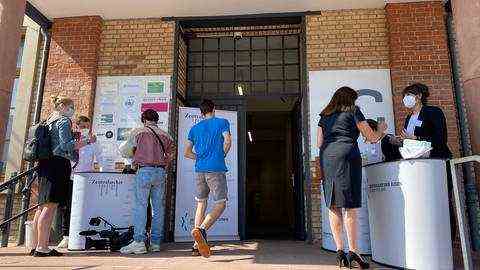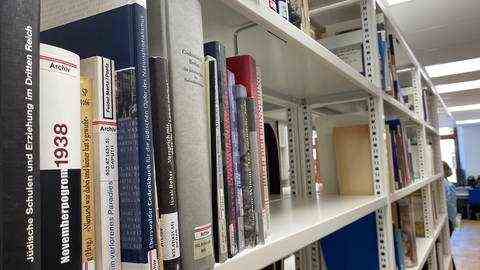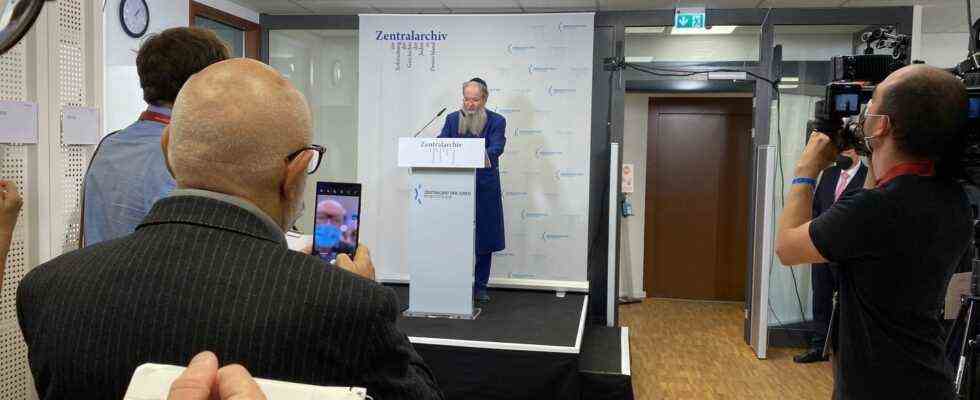The new central archive for researching the history of Jews in Germany in Heidelberg has been inaugurated with a ceremony. The archive was originally founded in 1987.
The President of the Central Council of Jews, Josef Schuster, emphasized that the archive preserves the memory of the Jewish communities and is therefore a great treasure.
The President of the Central Council of Jews, Josef Schuster, at the ceremony in Heidelberg.
SWR
“Such an archive is of central importance in order to ascertain one’s own past. At the same time, it is open to all non-Jews to find out more about Jewish life.”
Because almost always “a lack of knowledge, especially about a minority, leads to dangerous prejudices.” The archive is an institution of the Central Council of Jews in Germany. The Federal Ministry of the Interior bears the costs of the facility with around 900,000 euros annually.
Theresia Bauer: Safeguarding Jewish Culture in Germany
The Baden-Württemberg Minister of Science Theresia Bauer (Greens) said that the new opening will help secure Jewish culture in Germany for the future. The archive is invaluable. Only those who know where they come from can also think about who they want to be in the future.
“I am convinced that the central archive is also the place where the future growth of Jewish life will be documented.”
Federal Interior Minister Horst Seehofer (CSU), who was also expected, had canceled his participation due to other obligations.
Exciting documents from Jewish history in Germany
Since the beginning of the year, the central archive, which was previously housed in various branch offices, has been located in a former tobacco factory near Heidelberg Central Station.

Before the ceremony for the inauguration of the new premises.
SWR
The archive contains files and records from Jewish citizens from 1945 onwards, as well as literature on Judaism in Germany, as well as documents from the time of National Socialism and the Holocaust. Minutes of board meetings, old craftsmen’s bills, family estates and building plans depict Jewish community life in the German post-war period.
“How was it possible to develop Jewish life in Germany from nothing – that is reflected in the inventory of this institution.”
SWR reporter Eberhard Reuß on the archive and its director, Ittai Joseph Tamari:
In addition to the history of the Jews in Kraichgau, the archive contains collections of Frankfurt Jews and reports from Holocaust survivors that were recorded in Poland in the first post-war years.
Manuscripts, reviews and letters to the editor on the life of young Jews in Germany are archived by the former India correspondent of the “Süddeutsche Zeitung”, Peter Sichrovsky.

Holdings of the central archive in Heidelberg
SWR
On behalf of the Federal Ministry of the Interior, Building and Home Affairs, State Secretary Anne Katrin Bohle recalled at the ceremony that up to 1933 a third of all Nobel Prize winners had been Jews.
“This esprit was extinguished with the National Socialists.”
This “flourishing, intellectual life” can be found in the archive, said the State Secretary. According to the Central Council of Jews in Germany, the collection comprises more than 2,300 meters of shelves in cardboard boxes.
Development of a digital database for exchange planned
In addition to the collection of documents, the development of a digital database in the central archive is also planned to expand the global exchange with other archives. The President of the Federal Archives, Michael Hollmann, promised his support.
“Archives need staying power and you only set them up if you want to stay.
Worldwide interest in the stock
According to their own statements, the holdings of the archive are mainly used by students for scientific purposes. In addition, there are requests for access to files from historical associations, museums, family researchers – and, more recently, increasingly also from the USA, according to the Central Council of Jews in Germany in its announcement.

